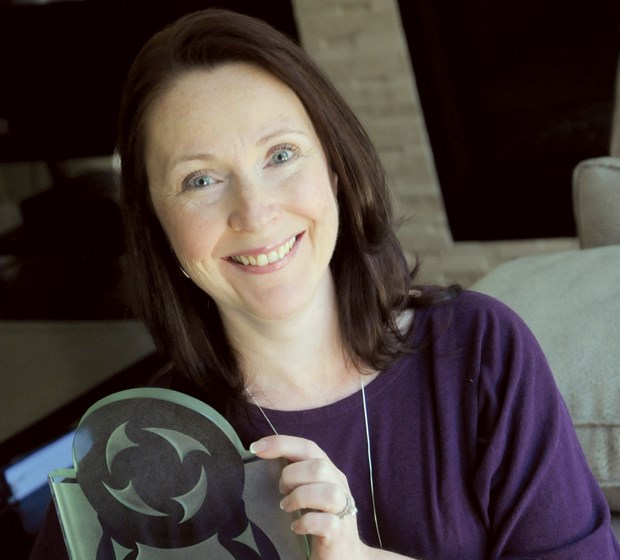In December 2005, everything changed for Christy Campbell in an instant.
Then 31 and working as a biologist, the Canyon Heights resident suffered a devastating stroke that left her unable to walk, talk or read due to aphasia. However, thanks to intensive therapy, the support of her husband, Sean Standing, and family and friends, she persevered and has regained her mobility, vocabulary and ability to communicate.
Campbell has also gone one step further and is a strong advocate for fellow stroke survivors, particularly those with aphasia. Throughout her recovery process she has often had to travel elsewhere to access useful resources. Wanting to prevent others from having to follow suit, she is continuing to play an integral role in helping establish more supports for brain injury survivors here at home in B.C.
“I had my stroke very young so I couldn’t really fathom that that was it. I was 31, so I just thought, ‘OK, this is the hand that I have been dealt. OK, I’m just going to do the best that I can with it.’ I tell people, I know it’s frustrating having aphasia, I get it, but tomorrow is a new day. Start every day with a positive attitude and just go forward,” she says.
For her efforts, both personally as well as publicly, the now 41-year-old North Vancouver wife and mother was recently awarded a 2016 Courage To Come Back Award. The awards are presented annually by Coast Mental Health and are intended to celebrate B.C. residents who have overcome illness or adversity and choose to give back to their communities, as well as inspire others to do the same. Campbell was awarded in the Physical Rehabilitation category, honouring her inspirational achievements in light of major trauma, requiring extensive physical rehabilitation, and for her efforts to give back.
“It means the world to us,” says Campbell, of the award nod, to her and her husband. “This is 10 years of our life after my stroke and dealing with my aphasia and trying to find the best resources that we can.”
Among Cambell’s achievements are co-founding the Sea-to-Sky Aphasia Camp (www.seatoskyaphasiacamp.com), a weekend-long event held annually in September that brings together people with aphasia, their families, and health care students interested in exploring different approaches to aphasia management.
Campbell attended a similar camp in Oregon. Reaping the benefits, she wanted to set up one closer to home and connected with Dr. Barbara Purves, a speech-language pathologist and associate professor in the University of British Columbia School of Audiology and Speech Sciences, to get the B.C. version up and running.
This year marks the seventh edition of the not-for-profit camp, made possible through a variety of partners. The 2016 camp will be held Sept. 16-18 at Camp Squamish.
Campbell also helped establish UBC’s Campbell-Purves Aphasia Education Fund, founded in light of Purves’ retirement out of an interest in continuing her legacy with the camp.
“She called me and said, ‘I’m OK with it, but your name needs to go on it too.’ … The fund is for either people with aphasia who can’t afford to come to the camp or students that don’t have the money to attend,” says Campbell.
Apart from her work with the camp, Campbell has volunteered with Providence Health Care and the Stroke Recovery Association of B.C. She also volunteers with Columbia Speech and Language Services and was a resource during its development of an intensive aphasia treatment program in Vancouver.
“Previously, British Columbians with aphasia had to travel to Halifax to receive such treatment in Canada,” says Wendy Duke, clinical director of Columbia Speech and Language Services Inc. “With her encouragement and guidance, the program that we have put together (iTAWC or Intensive Treatment for Aphasia in Western Canada, which is a specialty clinic of Columbia Speech and Language Services, Inc.) is now in its sixth year,” adds Duke, who nominated Campbell for her Courage To Come Back Award.
Campbell attended the Halifax program and is pleased that something similar is now offered locally. Both she and her husband plan to volunteer at the upcoming July session (itawc.com), and will address those with aphasia and their caregivers.
Despite having so much on their plates, Campbell and her husband are continuing to look to the future.
“My husband and I are always thinking about the next thing that we could do,” says Campbell.
“Now I think we’re going to focus on more funding for people with aphasia. The award is lovely but there’s still not enough funds to cover people with aphasia,” she adds.
Apart from her stroke and aphasia advocacy work, Campbell is also a busy mother to an active four-year-old. One of her favourite activities is reading her son, Cameron, bedtime stories.
“I’m still amazed that I can do it but I’m doing it. The funny thing is for Cameron, his vocabulary at four is very, very good. We are now doing sight words so I might slip up with one or two words – usually I switch a word that I know it’s the same meaning but it’s a different word. Now he picks up on that. ‘Mom that’s the wrong word!’” she says proudly.
Campbell was one of six recipients honoured at the 18th annual Courage To Come Back Awards gala dinner, held May 5 at Vancouver Convention Centre West.
The other five winners were awarded in the categories of Medical, Addiction, Social Adversity, Mental Health and Youth. More than 1,500 people were in attendance and more than $1.43 million was raised in support of Coast Mental Health to help those dealing with mental illness.



